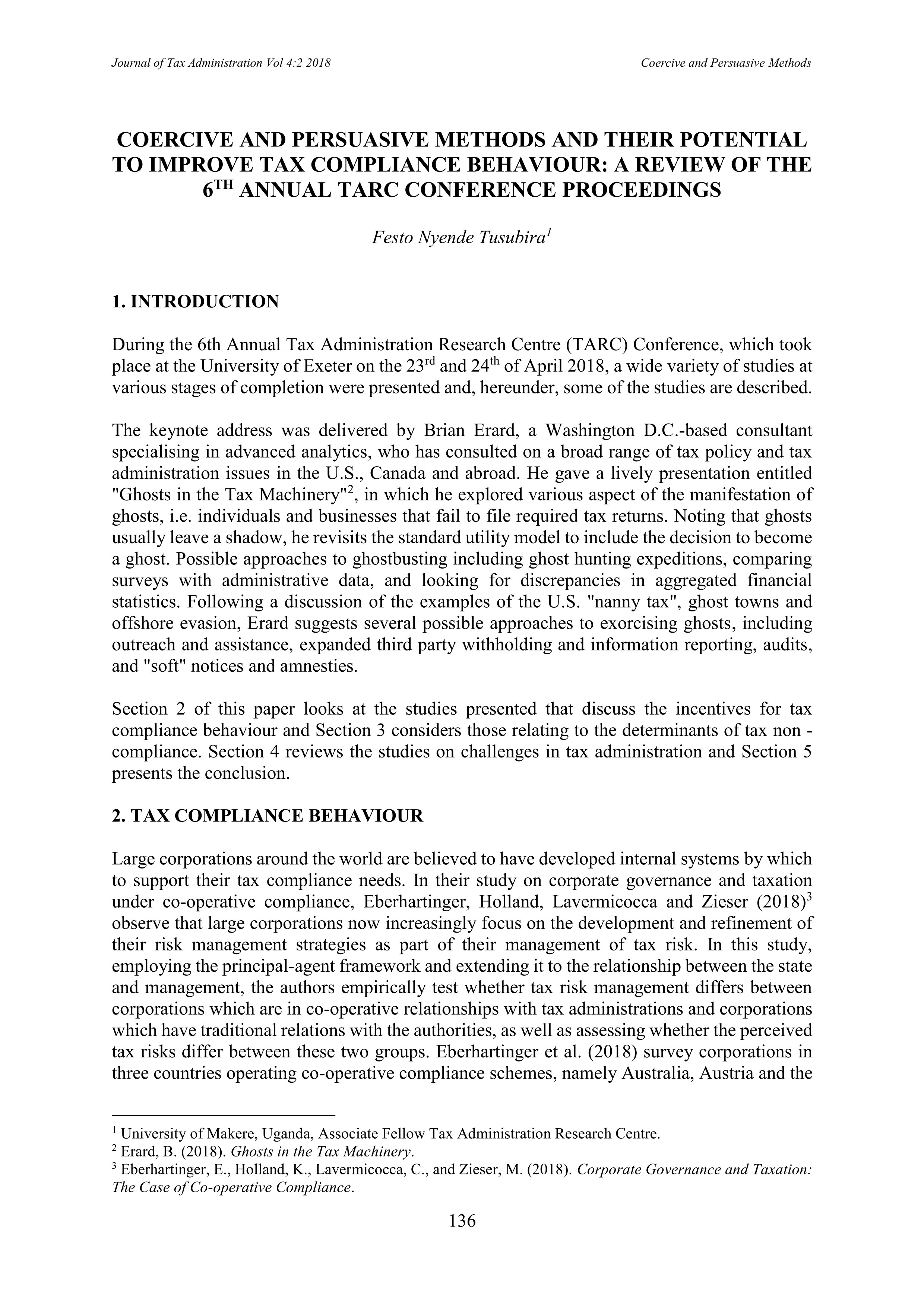Coercive and Persuasive Methods and Their Potential to Improve Tax Compliance Behaviour: A Review of the 6th Annual TARC Conference Proceedings
References
Allingham, M. G., & Sandmo, A. (1972). Income tax evasion: A theoretical analysis. Journal of Public Economics, 1(3-4), 323–338.
Alm, J., Jackson, B. R., & McKee, M. (2009). Getting the word out: Enforcement information dissemination and compliance behavior. Journal of Public Economics, 93(3-4), 392-402. https://doi.org/10.1016/j.jpubeco.2008.10.007
Beck, P. J., & Lisowsky, P. (2014). Tax uncertainty and voluntary real-time tax audits. The Accounting Review, 89(3), 867-901.
Feld, L. P., & Frey, B. (2007). Tax compliance as the Result of a Psychological Tax Contract: The role of Incentives and Responsive Regulation. Law and Policy, 29(1), 102-120.
Feldman, N. E., & Slemrod, J. (2007). Estimating tax noncompliance with evidence from unaudited tax returns. The Economic Journal, 117(518), 327-352.
Freedman, J., Loomer, G., & Vella, J. (2009). Corporate Tax Risk and Tax Avoidance: New approaches. British Tax Review, (1), 74-116.
Gemmell, N. & Ratto, M. (2012). Behavioral Responses to Taxpayer Audits: Evidence From Random Taxpayer Inquiries. National Tax Journal, 65(1), 33-57. http://doi.org/10.17310/ntj.2012.1.02
Gete, P. & Reher, M. (2016). Two Extensive Margins of Credit and Loan-to-Value Policies. Journal of Money, Credit and Banking, 48(7), 1397-1438.
Kirchler, E., Hoelzl, E., & Wahl, I. (2008), Enforced versus voluntary tax compliance: The "slippery slope" framework. Journal of Economic Psychology, 29(2), 210-225.
Kirchler, E., Kogler, C., & Muehlbacher, S. (2014), Cooperative Tax Compliance: From Deterrence to Deference. Current Directions in Psychological Science, 23(2), 87–92.
Kleven, H. J. (2016). Bunching. Annual Review of Economics, 8, 435-464.
Kleven, H. J., Knudsen, M. B., Kreiner, C. T., Pedersen, S., & Saez, E. (2011). Unwilling or Unable to Cheat? Evidence from a Tax Audit Experiment in Denmark. Econometrica, 79(3), 651-692.
Lavermicocca, C., & McKerchar, M. (2013). The impact of managing tax risk on the tax compliance behaviour of large Australian companies. Australian Tax Forum, 28(4), 707-723.
Mulligan, E., & Oats, L. (2009). Tax risk management: Evidence from the US. British Tax Review, 1(6), 680-703.
Organisation for Economic Co-operation and Development (OECD). (2014). Illicit Financial Flows from Developing Countries: Measuring OECD Responses. Paris: OECD Publishing.
Organisation for Economic Co-operation and Development (OECD). (2015a). Transfer Pricing Documentation and Country-by-Country Reporting, Action 13 - 2015 Final Report. OECD/G20 Base Erosion and Profit Shifting Project Series. Paris: OECD Publishing, Paris.
Organisation for Economic Co-operation and Development (OECD). (2015b). Addressing the Tax Challenges of the Digital Economy, Action 1 – 2015 Final Report. Paris: OECD Publishing.
Organisation for Economic Co-operation and Development (OECD). (2016). Co-operative Tax Compliance –- Building Better Tax Control Frameworks. Paris: OECD Publishing.
Organisation for Economic Co-operation and Development (OECD). (2017a). OECD Transfer Pricing Guidelines for Multinational Enterprises and Tax Administrations 2017 (pp.365-411). Paris: OECD Publishing.
Organisation for Economic Co-operation and Development (OECD). (2017b). The 2017 Update to the OECD Model Tax Convention. Paris: OECD Publishing.
Organisation for Economic Co-operation and Development (OECD). (2018), Tax Challenges Arising from Digitalisation – Interim Report 2018: Inclusive Framework on BEPS. Paris: OECD Publishing.
Pissarides, C., & Weber, G. (1989). An expenditure-based estimate of Britain's black economy. Journal of Public Economics, 39(1), 17-32.
Saez, E. (2010). Do Taxpayers Bunch at Kink Points? American Economic Journal: Economic Policy, 2(3), 180-212.

Downloads
Published
How to Cite
Issue
Section
License
Copyright (c) 2018 Festo Nyende Tusubira

This work is licensed under a Creative Commons Attribution 4.0 International License.
Our open access status means that authors retain the copyright of their work. However, all papers published in JOTA are done so under a Creative Commons Attribution 4.0 International license (CC BY). This means that others can share and/or adapt your work without your permission as long as they follow certain rules, including attributing your work correctly.
You can learn more about this on our Open Access, Licensing, and Copyright Policies page.



